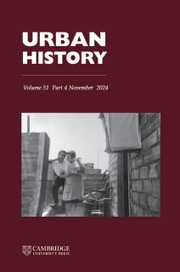No CrossRef data available.
Article contents
Leisure, consumption and the European city
Published online by Cambridge University Press: 08 August 2003
Extract
Producing and consuming studies of consumption has become a minor industry in its own right amongst the current generation of historians and it has moved significantly beyond the pioneering histories of shopping which we associate with Alison Adburgham and others. Instead, it has moved into the broader realms of cultural formation, both in wider terms of social change and in the context of regional and local identities, as well as international comparisons. So it comes as little surprise to find a batch of current studies which deal with the present complexities of scholarly approaches in distinctive but overlapping ways. In this development British historians have made significant pioneering contributions but it becomes apparent from some of the present offerings that initiatives may have moved elsewhere. That is hardly a cause for national mourning but at least some parts of the works reviewed here, written abroad, show an awareness of British developments which is too rarely reciprocated in studies originating on this side of the Channel and North Sea (or ‘German Ocean’ as more appropriate in view of the insularity which produces them). Perhaps the appalling inability to read European languages now so common amongst both under- and postgraduate students is also more widespread amongst academic historians than we have realized or are prepared to admit. It is also very likely that the situation is being exacerbated by the short termism of the Research Assessment Exercise's demands for a frequency of output which militates against the extended period necessary for sophisticated comparisons – so much of its classification of ‘international excellence’ seems more to do with single-focused rather than real international studies. Yet there is much on offer in Europe in particular which cries out for more systematic comparative analysis and some of the work reviewed here offers a good starting point.
- Type
- Research Article
- Information
- Copyright
- © 2003 Cambridge University Press


